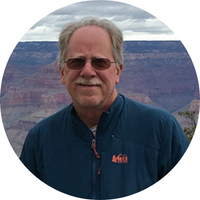
Having spent nearly 30 years working at Eastman Chemical Company, and now 13 years at Virginia Tech (VT), what advice do you have for young chemists debating whether to opt for a career in industry vs. academia?
The path I was able to take (first industry, then academia) was ideal. Industry taught the frontiers in my discipline. Industry provided all of the professional development skills that one does not get (or anyway, not in my day) in grad school. How young assistant professors thrive after being thrown into the deep end of a tenure track position without ever (in most cases) having led a group, without training in teaching, without interdisciplinary experience in many cases, often without experience in persuasive writing (i.e., research proposals) is beyond me. Both careers have been satisfying.
Academia doesn’t pay quite as well, is challenging as noted above, and is even more consistently demanding than industry. In industry I was highly focused, put in pretty long hours; but then largely left the job at the gate when heading home. Collaborations were satisfying and constant, there were so many opportunities to learn new things, the things we created sometimes became significant commercial products, and the compensation was good.
The job in academia is harder to leave in the office. Nearly everything one gets to do in academia is worthwhile, and mostly fun. The opportunities to work with young people and influence their lives in (hopefully) positive ways is a real privilege. Living in a college town is a pleasure. I always tell people it is the greatest job in the world, and this can be proven; professors emeriti keep coming in and doing the job even after they stop being paid!
My advice to young chemists thinking about professions is pretty simple: do fundamentally sound work, and work on important things. Such a strategy will serve you well in either industry or academia.
How does a recent chemistry undergraduate – aiming for a career in industry – decide about investing the time and money to pursue a Ph.D.? What should they think about as they make this important decision?
For me it was about independence. Turns out there are interesting things to do with a BS Chem, but most of them I didn’t know about at the time. The ability to have more control over my day, solve problems, be creative – all those things seemed more possible with the kind of job a Ph.D. gets you.
And in my experience, that was exactly correct. But if your thing is more working with people, or business, as a couple of examples, a BS can get you into sales or into customer service, or technical business leadership; a Ph.D. might not be necessary for those career paths.
What non-technical skills are most responsible for your significant career advancement? Which do you most emphasize with your students at Virginia Tech?
At VT, one of my jobs now is being associate dean of the grad school, and one of my projects is to improve professional development of our grad students. This is a passion for me, in part because of the industrial background.
Probably oral communication is the most crucial element that hasn’t been taught well to students in the past. Back in the dim past of my Duke grad school days, we had very few opportunities to make technical presentations to diverse audiences; maybe 2-3 of them the whole time in grad school. Today students get far more opportunities, but the actual teaching about how to make effective presentations is still spotty.
I take every opportunity at VT to work with students and teach them the fundamentals of making presentations. They need to understand that such proficiency is critical to nearly every job, that it is not an innate skill but rather a learned one, and that they can grow to be highly effective presenters. My hope is that VT students will become famous for their skills as communicators!
What can academia do to better prepare chemists for a career in industry?
In addition to communicating, it’s important to learn to work effectively across disciplines, and within teams. The chemical industry is the classic interdisciplinary environment. You might work closely with engineers or biologists. You may need to convince MBAs to fund your project. You might need to teach salespeople – perhaps English majors! – to sell the product you’ve invented. Preparing operations personnel who might be high school grads to manufacture your new drug or polymer.
You’ll work together with a diverse group of people on a team against imposed deadlines that may range from challenging, to downright crazy. You will lead teams at times; often leading without direct authority over your team members. That means you must convince them of the merit of the goal and of the pathway you’ve set out to get there, and make it clear they can trust you.
Teamwork and interdisciplinary collaboration can and should be a part of a graduate degree program; students should ask advisors for such experiences, seek them out wherever you can. Often, we reinforce solo research in grad school as the ideal; I would advocate to students to collaborate, collaborate, collaborate; and to research advisors, to support your students in doing so.
It can be a challenging time to be a mid-career chemist working in industry. You lived that life for a number of years before transitioning to academia. Any advice for your former mid-career industry colleagues who wish to continue to thrive professionally?
At one point, I was group leader over a large group of people with whom I felt very comfortable, directed at a topic right in my wheelhouse. Did that for 5 years, felt competent at it. Yet after 5 years it was time to do something else; my growth and that of the people in the group demanded it, despite our comfort with the status quo.
Seeking that change led me to working in a whole new field, on a startup business, with much more responsibility, and learning many things that benefit me and my students to this very day. Everyone’s situation is different. Some love making technical contributions in their field and enjoy doing that for an entire career. Some thrive on new challenges; for them a big company can provide those challenges, or they may need to change jobs to find what they need.
Chemists get remarkable training and have a wide range of skills; they rarely fully appreciate the range of skills they possess. Chemists are trained how to think about complex problems, investigate in detail what has been done before, formulate a plan of attack, including planning for contingencies, and carry out that plan. We are trained to recognize the limitations of our own knowledge, and to seek help from others when needed.
These and many other skills can serve us well in making new compounds, characterizing them, determining their properties – or in totally different endeavors that are only tangentially related to chemistry. So my advice would be, follow your passions without fear. Be ready to make changes and try new things; you are better prepared for them than you realize.
Speaking of mid-career, what prompted you to leave industry for a career in academia?
ACS gave me the opportunity. Eastman was great to work for and I enjoyed my career there thoroughly. Eastman gave me the opportunity to go to ACS meetings, make a few presentations, serve in division governance, even publish a bit (students … it’s much harder today to publish in industrial jobs). That ACS networking led directly to a phone call from VT, asking me to apply for a faculty position. Key VT faculty knew me from working together in the CELL division and hearing my presentations.
And why make the change at that late date? Just the opportunity to work with young people every day and live in a beautiful university town like Blacksburg, at a highly collaborative, excellent university like VT. I’m the luckiest guy on Earth to have enjoyed not one but two intensely satisfying careers.
What leads you to believe that sustainable polysaccharide derivatives can ultimately replace unsustainable fossil-based materials? And why does it matter?
Well, of course they already have in many cases. We use plastics, fibers, paint, pills, tape, things that modify the rheology of water – all improved by polysaccharides. Polysaccharides are by far the most complex polymers in nature, incredibly abundant, with unparalleled diversity, and usually benign.
Many of them have properties that make them relatively easy to collect from nature. They’re well-suited for modification to target desired properties. The truth is we have seriously neglected these wonderful, sustainable natural resources. Few if any grant programs focus on polysaccharide science; a great missed opportunity.
There are so many opportunities for students; for example, you can pioneer in understanding how polysaccharide synthesis is controlled (not templated like nucleic acids and proteins), how to sequence them, how to detect, quantify, amplify them in natural organisms. In many ways, polysaccharide chemistry is in its infancy vs. that of DNA and proteins. And by unlocking those secrets, by developing these tools, we can harness the power of polysaccharides to enhance human health and replace fossil-based materials with degradable, benign, renewable, high-performance materials; not just replacements, but improvements!
As a former ACS local section and division chair, and as a former chair of two important committees – Divisional Activities and Meetings and Expositions – what do you think are the most pressing issues confronting the American Chemical Society as it moves into a new decade?
Probably it’s clear to readers by now that ACS means a lot to me. To keep it strong, there are at least two big things we need to do. It is a challenge for young people to find their place at our big meetings and in our big Society. We need to make our divisions, local sections, meetings, and Society in general more welcoming to young chemists and to young people who are thinking about becoming chemists.
The second big thing we need to do is get better at advertising what we do. Chemists do so many things to help society, create so many useful inventions, solve so many knotty problems, by their intense and effective training fill so many key roles in society. But many chemists tend to be more reserved than the average person; we are not good at communicating the value of the contributions of the Central Science to the public. This is another aspect of training that is important for universities: teaching students to communicate in ways appropriate to the audience, avoiding jargon that can’t be understood by your listeners. When we clearly communicate the novelty and societal impact of what we do, it tends to interest and engage people; this is what we need to do.
One more thing I would add to my former industrial colleagues: re-engage with ACS. I had research leaders at Eastman who valued ACS membership and even leadership greatly, and strongly encouraged our engagement. My sense is that few current industrial leaders do so. I would encourage the current generation of industrial research leaders to strongly support your chemists joining and becoming active in ACS. The benefits to them and your organization, in terms of knowledge, personal growth, developing leadership skills, will far exceed the cost of your support.
You have published more than 100 papers in peer-reviewed journals, and you have been awarded more than 20 US patents. What is more gratifying to you: getting published or earning a patent?
It’s great fun, not so much to get a patent as to see it used. The experience of seeing a process you created being used to manufacture things at many-kilo scale is quite satisfying.
With that said, getting what you feel is an important paper accepted and published in a high-impact journal is pretty sweet too. And then there is the, perhaps, even greater pleasure of seeing the look on the face of one of your students when their first paper is accepted.
And I have to mention another thing that we organic chemists experience that you didn’t mention: the first time that you prepare a compound that has, as far as can be determined, never before existed on Earth. Holding a vial of such a substance in your hand for the first time is a pretty special moment – knowing that you are looking at something you designed and created, that nobody has ever seen before.
Your dad was a B-17 crew member flying over Europe in World War II, and an uncle (your Dad’s brother) served as a B-26 crew member in the Pacific theatre. How did their experiences so many decades ago influence the person you are today?
My Dad lost his Dad when he was about 11; they didn’t have much money and he had to work from that age onwards. He was drafted out of high school, flew 52 missions over occupied Europe, came home and finished high school at night, then thanks to the GI bill was able to go to college for his engineering degree at night, all while working during the day to help support his Mom. He would never speak of his war experiences; I think they were just too difficult to explain to his family who had not endured such horrors. But he did leave a detailed diary, which his sons treasure.
I always think that the first mission must have been hard enough, terrifying; but how those guys then got up for the second mission, the tenth, the fiftieth, now knowing what awaited them over Europe; it’s a level of courage I don’t pretend to be able to comprehend. He set an example of quiet strength, kindness, decency that is an ideal to strive for. His ability to quietly influence those around him was nearly magical; again, something to strive for.
All I have relies on his sacrifice; that’s something never to forget. Seems to me that selfishness has been on the rise the last several decades; it is time for us to dedicate ourselves to working together towards larger principles and causes, as his generation did.
What is an Appalachian Trail 2000-miler, and what motivated you to become one?
The AT is actually about 2200 miles long, and “2000-milers” have hiked every bit of it from Georgia to Maine. Some do it in one long backpacking trip from early spring to late summer; so-called “through-hikers”. Others, like me, hike it in sections (over about 10 years in my case).
Hiking the AT afforded awesome views, camaraderie, feeling of accomplishment; the experience of special places that you just can’t see without getting out in the woods. The bear and her cub in Maine, the porcupine up in the tree who was just about eye to eye with me in Massachusetts, the moose who blocked the trail in Vermont, the magnificent, large, isolated lakes in Maine that had no signs whatsoever of human habitation. The perfect glacial cirques of Mt. Adams in New Hampshire, and Mt. Katahdin in Maine. The view from Springer Mt. in Georgia after dark, where in 360° only a couple of pinpricks of light could be seen.
The AT is a true American treasure.

Dr. Edgar is a professor in the Virginia Tech (VT) Department of Sustainable Biomaterials, and adjunct in the Department of Chemistry. He is an active member of the Macromolecules Innovation Institute, with its internationally renowned Macromolecular Science and Engineering interdisciplinary graduate program, and a leader of the VT Center for Engineered Health. He is associate dean in the VT Graduate School. His interests include synthesis of novel polysaccharide derivatives, unraveling their structure property relationships, and exploiting their useful properties in demanding, high-value applications.
He is a Fellow of the ACS and of the Cellulose and Renewable Materials Division. He is an editor of Carbohydrate Polymers, associate editor of Cellulose, and member of the editorial advisory board of Biomacromolecules. Edgar received his BS in Chemistry from Bucknell University, and his Ph.D. in Organic Chemistry from Duke University.
This article has been edited for length and clarity. The opinions expressed in this article are the author's own and do not necessarily reflect the view of their employer or the American Chemical Society.
Copyright 2020 American Chemical Society (All Rights Reserved)







